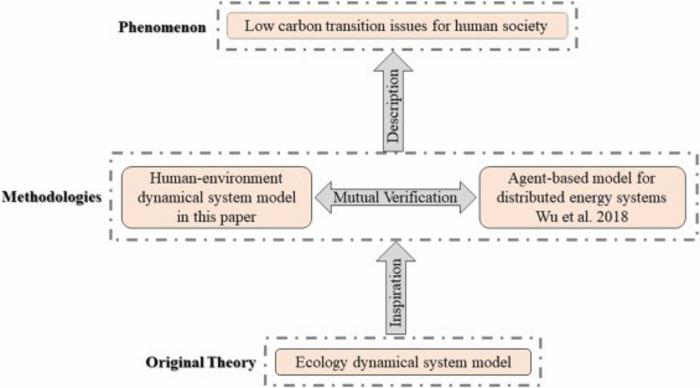The global transition to a low carbon society is a complex endeavor, demanding a comprehensive understanding of the intricate social change processes involved. In a study published in the KeAi journal Journal of Economy and Technology, a team of cross-national researchers drew inspiration from ecology and complex systems science to construct a dynamic system model to describe the dynamics of a low carbon society.

Credit: Xifeng WU
The global transition to a low carbon society is a complex endeavor, demanding a comprehensive understanding of the intricate social change processes involved. In a study published in the KeAi journal Journal of Economy and Technology, a team of cross-national researchers drew inspiration from ecology and complex systems science to construct a dynamic system model to describe the dynamics of a low carbon society.
“This work lays the groundwork for future multidisciplinary research and offers insights into key parameters, stability, policy adjustments, and strategies for low-carbon transitions,” said Xifeng Wu, corresponding author of the study.
To ensure the reliability and applicability of the dynamic system model, the team delved into the analysis of local stability. The findings illustrate that the model aligns with Agent-Based Models (ABMs), confirming the possibility of multidisciplinary research and validating the feasibility of the proposed approach.
“By establishing a strong foundation for research integration, this analysis paves the way for further exploration and refinement of the model, thus enhancing our understanding of low carbon transition dynamics,” Wu added.
Notably, by visualizing the potential outcomes of different policy decisions, phase diagrams enable the formulation of effective low-carbon transition strategies tailored to specific country contexts. This framework allows policymakers to make informed choices and facilitates the alignment of national policies with sustainable development goals.
As low-carbon transitions encompass a wide array of equilibrium and non-equilibrium phenomena, such as sinks, bifurcations and disruptions, future research can expand the dynamic system model. By introducing competition and selection mechanisms between energy types, the model can look into more complex dynamics, offering a deeper understanding of the intricate processes associated with low-carbon transitions.
###
Contact the author: Xifeng WU, The University of Tokyo, SCS Lab, E-mail address: [email protected]
The publisher KeAi was established by Elsevier and China Science Publishing & Media Ltd to unfold quality research globally. In 2013, our focus shifted to open access publishing. We now proudly publish more than 100 world-class, open access, English language journals, spanning all scientific disciplines. Many of these are titles we publish in partnership with prestigious societies and academic institutions, such as the National Natural Science Foundation of China (NSFC).
Journal
Journal of Economy and Technology
DOI
10.1016/j.ject.2023.04.001
Method of Research
Computational simulation/modeling
Subject of Research
Not applicable
Article Title
A dynamical system model to analyze the low carbon transition in energy-economic system
COI Statement
The authors declare that they have no known competing financial interests or personal relationships that could have appeared to influence the work reported in this paper.




